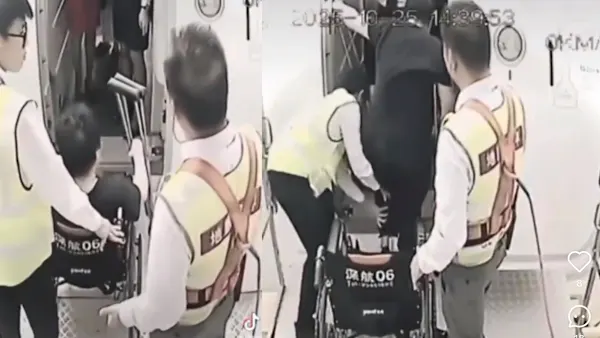Copyright channelnewsasia

“Inclusive societies are intentional, not incidental,” Lee May Gee, chief executive of SG Enable, Singapore’s focal agency for disability inclusion, told CNA. “Accessibility is not charity or compliance. Empathy must translate into design choices and service norms that anticipate needs rather than react to them.” DEBATE AND BACKLASH The discussion soon took another turn. Days after Zheng Zhihua’s post went viral, CCTV footage began circulating online, showing airline staff assisting him onto the plane - a scene that appeared at odds with his earlier claim that he had to “crawl” inside. The video reignited debate, with some accusing the veteran singer of exaggeration. “Even as a disabled celebrity, he shouldn’t make things up,” one user wrote. “There’s video evidence.” “Calling it ‘inhumane’ was too much,” another said. “Zheng went too far.” But others came to his defence, arguing that regardless of the details, Zheng had spotlighted a long overlooked and important issue. “If it weren’t Zheng Zhihua, would anyone have spoken up for people with disabilities? Would we have seen such a quick response? Thank you for using your voice,” said one Weibo user. In a follow-up post, Zheng clarified that his words were written “in frustration”. He apologised and thanked staff who had assisted him. “Shenzhen Airport has already apologised to me personally, and I don’t intend to pursue the matter further,” Zheng said. “I believe this was the misconduct of one lift operator, not the airport as a whole.”He added that he hoped the incident would prompt better assistance for passengers with disabilities. “Shenzhen is a city I love, and its people are outstanding. I hope the airport can live up to that same standard of excellence.” Even state media weighed in. In a commentary titled Public Discussion Should Allow Imperfect Expressions, state broadcaster CCTV said that while Zheng’s choice of words had been emotional, the frustration behind them was valid and reflected wider barriers still faced by people with disabilities. The piece urged readers not to let disputes over phrasing overshadow real problems such as boarding gaps, missing ramps and inconvenient toilets, which “undermine dignity and limit participation”. It also praised Shenzhen Airport for its swift response and testing of new slope connectors, calling the issue “not unsolvable”. “Progress comes when society moves beyond individual disputes and confronts shared challenges, turning public outrage into practical improvement,” the piece said. WHEN AI GIVES A HAND Another conversation is taking shape - one about the possibilities that technology could unlock for people with disabilities. For Zheng Bowen, a 25-year-old entrepreneur from Zhejiang, technology is more than a tool - it is a lifeline. Paralysed from the chest down after a fall from a five-storey height at 17, Zheng turned adversity into invention. Drawing on his background in interior design and the Internet of Things (IoT), he opened a smart-home experience store in Hangzhou - a space where technology meets accessibility. His goal is simple: to make intelligent home systems affordable for people with disabilities, so independence is no longer a privilege. In his showroom, everyday life is automated. Voice commands switch on kitchen lights, toilet seats adjust at a touch, and personalised bedtime settings trigger night-mode scenes. “Technology gives me independence,” he told CNA. “I don’t need to call someone every time I want to move around.” Across China, that same sense of empowerment is increasingly being shaped by machines. From hospitals to homes, assistive technology is fast moving from laboratories to living rooms. In the northeastern city of Changchun, 35-year-old traffic officer Liu Boqi became the world’s first quadriplegic patient to regain voluntary movement through a spinal nerve-interface implant.



